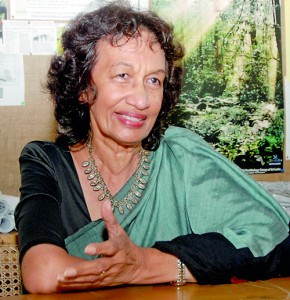‘Landscape architecture is about people’
Shiranee Balasuriya’s love for the environment blossomed at home as she watched her mother meticulously put together flower arrangements. Years later Prof. Balasuriya would initiate the course in Landscape Architecture at the Moratuwa University and it is her passion for this somewhat unrecognised field that earned her a Zonta Woman of Achievement Award last month.

Prof. Balasuriya: Nurtured a love for nature from childhood days. Pic by M.D. Nissanka
“I wouldn’t call it an achievement,” smiles Professor Balasuriya, referring to her career, explaining that during her schooldays, women had very limited career prospects. Many of her batch mates from Ladies’ College, Colombo, she says, went on to become doctors, engineers and lawyers. Only allowing her friend to send in the application for the Zonta award because the field of Landscape Architecture could use the publicity if she won, she feels “there are many others who deserve the award-even homemakers.”
Entering University of Colombo in the ‘60’s to start on her undergraduate degree in architecture she was one of the few women in her class- a situation Professor Balasuriya is now very well accustomed to. Privileged to have international guidance, the course being one affiliated to the Royal Institute of British Architects (RIBA) she recalls that it was one of the newer courses offered by the University at that time. Being one of the very few women on the course she feels the lecturers were nothing but encouraging, “We were a little spoilt,” she laughs.
She returned to Sri Lanka after completing her Bachelor of Architecture in the University of Newcastle-upon- Tyne in 1973 and getting her Royal Institute of British Architects Charter in 1974. Beginning an academic career, lecturing at the University of Moratuwa in 1975 marked the start of a wonderful journey she says, one that she wouldn’t give up or change for anything, save her family.
Subsequently awarded a British Council Scholarship to specialise in Landscape Architecture, in 1981 she received her Master of Philosophy in Landscape Architecture from the University of Edinburgh and initiated the M.Sc. Landscape Design Course at the University of Moratuwa with the support of the University of Edinburgh.
In 2013, being the pioneer in Landscape Architecture which she believes is a need of the hour for Sri Lanka given the large scale of development taking place, she initiated an undergraduate course in Landscape Architecture at Moratuwa with the support of numerous past pupils after 39 years of service at the University. Counting the SAARC Convention Centre in Maldives that she designed and being the landscape consultant to the Lotus Towers Project to be her biggest achievements she feels the courses at the university are her contribution to the much needed Landscape Architecture industry of Sri Lanka.
What many people fail to see according to her is that Landscape Architecture is about people. “There is a design element, but that’s minimal,” she shares.
It’s about people and how they need open spaces to be healthy mentally, physically and socially.
Passing on her values of preserving bio-diversity and need for as many open spaces as there is a need for structured building to them, her hope is that her students “go on to become the custodians of the natural landscape of our country.”
It doesn’t come as a surprise that lecturing has never been just confined to theory. Taking interest in her students on an individual level finds her being more of a mentor than a lecturer in a strict sense. “I do everything from encourage them to not give up on their careers to help them sort-out financial issues,” she smiles. Agreeing fully with Mahatma Gandhi that ‘a woman’s marvellous power is lying dormant, if the women of Asia wake-up they will dazzle the world’ she has taken it upon herself to encourage her female students especially to not give up and finds joy in helping them reaching their fullest potential.
The nurturing approach which comes naturally to Prof. Balasuriya doesn’t stop with her family and students but seems to branch-out to her take on architecture as a whole. Growing up at a time when children had nearly no entertainment indoors, sans the distractions of television and tuition classes she spent most of her childhood outdoors-“we didn’t have dengue scares at that time” she laughs.Watching her mother work on her garden, and a particularly inspiring botany teacher at school sparked her interest in nature.
Yet for all her impressive career, she is categorical that it is her family that comes first. “I would have given-up my career for my kids” she admits. She herself had a very good childhood and says she felt her children were entitled to the same. Had her mother and mother-in-law not been able to help with her son and daughter when they were younger she has no doubt in her mind that her job would have come second. Pottering around the kitchen and making them treats or just being at home when they return from school are duties she feels which are equal to or even more rewarding than her many academic and professional accolades.


